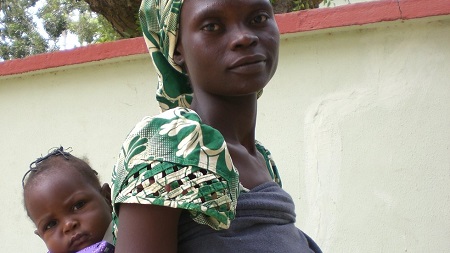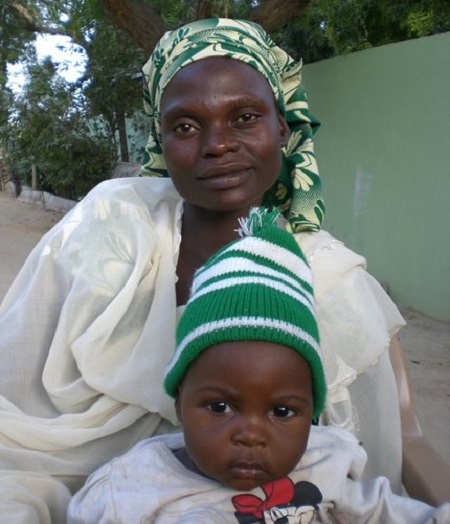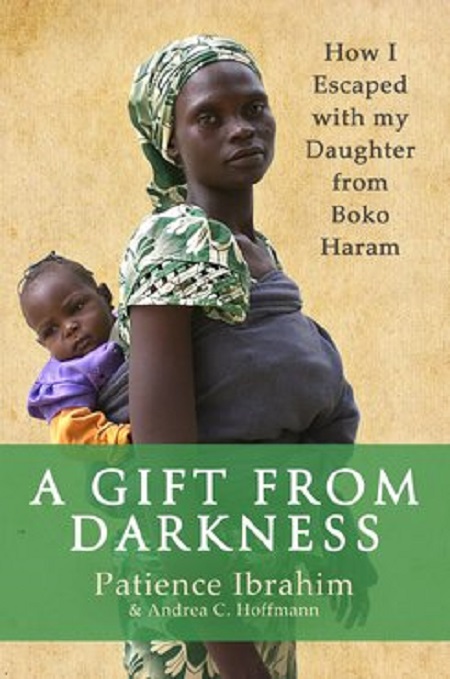Hot Stories
Recent Stories
Explosive! Young Mother Who Escaped From Boko Haram Tells Interesting Tale of How She Survived
Posted by Samuel on Fri 07th Apr, 2017 - tori.ngA woman who managed to escape from the horrific jaws of the deadly Boko Haram terrorist sect, has told of her terrifying experience.

Patience Ibrahim escaped from Boko Haram
Boko Haram, one of the world’s deadliest terror group, made international headlines on 15 April 2014 when they abducted 276 schoolgirls from a school in Chibok, Nigeria, sparking a global campaign to #BringBackOurGirls.
Now, almost three years later, 195 of those schoolgirls are still missing, and the threat of Boko Haram continues to grow, particularly for women: just last week, a further 22 girls and women were kidnapped by the group in north-east Nigeria.
With the threat from the group increasing, one brave teenager, who was captured by the group while pregnant, has come forward to share the story of how she escaped captivity twice before giving birth to her daughter, Gift.
The first kidnapped girl to testify about her mistreatment, Patience Ibrahim recalls tales of r*pe, beatings and even cannibalism endured by her and her fellow prisoners in her new book, A Gift from Darkness.
Published yesterday and co-authored by journalist Andrea C. Hoffmann, the story is an inspirational tale of hope.

Here, Stylist.co.uk publish an exclusive extract from the book, offering a snapshot of life as a Boko Haram prisoner.
"I couldn’t sleep all night. I lay among the other girls uneasily, with an extremely queasy feeling in my stomach. Jara slept on my left, Hannah on my right. I could feel their breath. Luckily it had stopped raining. Still, we had to cuddle up together so that the general dampness and the cold of the night didn’t get too much for us.
"I listened tensely to the noises around the camp, the sounds of animals and people. I was more afraid of the people: every footstep in our direction, every rustle made me start. Because people who ate other people were capable of anything; they had lost their own humanity long ago. In this place I had to be prepared for the worst at all times, I knew that in my belly. But nothing happened that night.
"Eventually tiredness took over and I fell into a half-sleep​ with disturbing dreams: first my dead mother appeared to me, then my father, who had also been murdered in my imagination. Last of all I saw Ishaku with blood all over his face. Those images left me seriously shaken, because I couldn’t tell whether my mind was just coming up with evil fantasies, or whether what I saw corresponded to something out there in the real world.
"The next morning I felt exhausted when the prayer leader woke us with his singsong chant. First of all we had to join in prayer again. Like everyone else I had slept in my clothes. Of course there was no opportunity to wash in the camp. And no toilet: if you wanted to relieve yourself you had to go behind a tree or do it in front of everybody’s curious gaze.
"Particularly for us women that was a source of shame, as the men didn’t look away and made lewd remarks as they watched. “Come on, show me that fine arse of yours,” a man whispered when I actually thought I was unobserved and crouched down behind a bush. “If I like it I might take you.” He laughed.
"Horrified and confused, I stopped right there and fled back to the group. I soon learned not to get too far away from the others. Otherwise the guards came after us – and you really didn’t want to run into them on your own.
"So I chose to stay near the other women. If you have no other option, you lose your pride. Sometimes events in this place even made us forget our humanity. We felt like animals.
"I discovered that life in the camp was based on a few simple, fundamental rules. They relied on terror, intimidation and constant surveillance on all sides. The different groups held one another in check.
"The ‘infidels’ – the ones who had originally been Christians and were now supposed to have converted to Islam – occupied the lowest rung in the pecking order. We women and girls were effectively the slaves of the camp and had to do all the lowly jobs: fetching water, collecting wood, keeping the camp clean.
"We had no rights, and anyone could treat us exactly as they wished. There were no infidel men among the prisoners: I assumed that most of them had been killed. Only men who immediately joined the group had any chance of survival. The ‘Muslims’ – those who had been Muslims in their earlier life, or who were considered to be converts and now had to prove themselves as new members of the group – were a rung above us.
"The women in this category had each been assigned to a different Boko Haram fighter as ‘wife’. They were seldom seen, since according to the strict programme of the sect they were entirely devoted to the physical wellbeing of their husbands. In their part of the camp there were a few walls made of plastic sheets to protect them against the eyes of the others when they had to perform their duties.
"The Muslim men who already had some fighting experience were our guards; some of them were very young, perhaps even younger than me. They could earn special laurels for themselves if they treated us very severely. Their cruelties were sometimes breathtaking.
"When they behaved like that they were probably trying to impress the long-serving members of the sect. On the other hand, if they earned a reputation for treating us too carefully, they themselves risked falling into disfavour.
"The Boko Haram fighters closely observed the behaviour of the newcomers in the group and even kept a record of it. Their regime of terror extended into their own ranks: there was no room for fighters with scruples or any kind of inner inhibitions. Only those who took real pleasure in murdering and torturing ‘infidels’ were considered ‘true’ Muslims, and could go on living amongst them in the long term.
"All others ended up on a blacklist. A list that could only mean a death sentence. So everyone in the camp – from those at the top to those at the very bottom – was acting out of fear, constantly trying to protect their own lives.
"As the lowest group in the hierarchy it was particularly hard for us girls. That began with the distribution of the equipment available in the camp: everyone apart from us had plastic sheets and blankets to protect themselves against the weather. But at night we slept on the bare ground. And if we fell ill there was no medicine for us. And we only had one meal a day: soup.
"Of course we lived in constant fear of attack from the men. According to their own rules they didn’t have the right to r*pe us, but in unobserved moments it was bound to happen. No one was repelled if a fighter whose rank was high enough dragged a woman into the field to abuse her. Such behaviour went unpunished.
"And if they liked us they could force us to become their ‘wives’. Because according to their terms that was our actual purpose. And as they all had several wives, there was a constant need for new candidates. Young and beautiful women, of whom I was unfortunately one, were much in demand. It seemed as if they couldn’t get enough of us. Sometimes I even suspected that it was the uncomplicated access to women that drew men to the movement in the first place.
"With the so-called ‘marriage’ – which according to Boko Haram rules could only take place if the woman was considered to be a pious Muslim – one was no longer fair game for everyone, but exposed to the sexual desires of only one man.
"I saw it as a kind of rapist’s charter. Still, some women saw it as a better choice than unprotected status. I found myself wondering desperately how I could avoid becoming an adulteress just because someone had decided I was to be the wife of another man. I always stayed in the background and tried where possible not to attract any attention to myself. Ideally I would have made myself invisible.
"The nights were the most dangerous time for us. That was why we always slept in a row, pressed tight against one another. As soon as the sun had set no one dared to move so much as a step away from the others. But the ones on the outside still had visits at night. Unfortunately I know that from my own experience."
A Gift from Darkness: How I Escaped with my Daughter from Boko Haram by Patience Ibrahim and Andrea C Hoffmann, £12.78 from amazon.co.uk

Images: Andrea. C. Hoffmann
Top Stories
Popular Stories
Stories from this Category
Recent Stories

















































